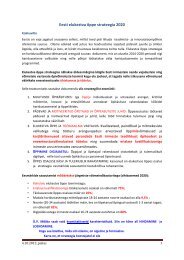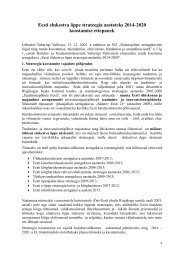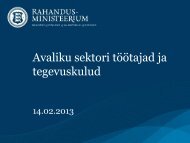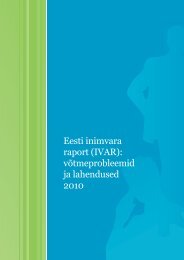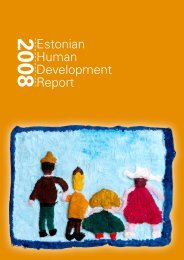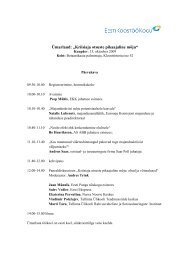DEVELOPMENT
The pdf-version - Eesti Koostöö Kogu
The pdf-version - Eesti Koostöö Kogu
Create successful ePaper yourself
Turn your PDF publications into a flip-book with our unique Google optimized e-Paper software.
Table 5.4.2<br />
Important cooperation regions for Estonia, % of respondents by group<br />
Entrepreneurs<br />
Economic<br />
policymakers<br />
Politicians<br />
Cultural<br />
figures PhDs Total<br />
Baltic Sea Region 77 79 81 66 70 75<br />
EU 69 59 65 51 66 62<br />
USA 38 17 30 17 25 24<br />
Russia 31 52 60 54 41 50<br />
Other CIS countries 38 24 23 26 14 23<br />
China 31 33 44 49 45 42<br />
As can be seen, the Estonian elite as a whole supports<br />
the more centralised options for the future development<br />
of the EU, whereas the positions of the political elite and<br />
economic elite differ somewhat. The economic elite were<br />
unanimous in their support for the option, in which,<br />
regardless of the centralisation of supplementary functions,<br />
the EU would still remain a union of nation-states.<br />
Among the political elite, this option is also the most<br />
popular, although, one third of them still supports the<br />
movement toward a federal state.<br />
The upward trend in the attitudes that favour the<br />
strengthening of the EU’s authority are corroborated by<br />
the results of the last Eurobarometer, which show a shift<br />
in the attitudes of Estonia’s general public in the same<br />
direction (Public… 2013). However, if we compare the<br />
results of the elite survey, which is used here, to the survey<br />
of the European political and economic elites conducted<br />
between 2007 and 2009, we see that there is a<br />
considerable shift. In the European Elite Survey, Estonia<br />
stood out for its quite rigid opposition to the centralisation<br />
trends inside the European Union (Best et al., 2012),<br />
by taking the most critical position among the states<br />
under observation along with the United Kingdom.<br />
Which states/regions are the ones on which Estonia’s<br />
trade policy should focus more in the next 10 years than<br />
previously? We gave the respondents a list of states and<br />
regions, and asked them to choose the most important<br />
ones. The answers are shown in Table 5.4.2.<br />
From the results, it can be seen that there is a desire<br />
to strengthen the traditional economic relations, as well<br />
as to expand the geography of economic relations. The<br />
assessments of the various elite groups differ only a little,<br />
from each other.<br />
Estonia’s neighbouring market – the Baltic Sea<br />
Region – was named as the area requiring the most<br />
attention (three-quarters of the respondents considered it<br />
necessary to concentrate more on economic ties with the<br />
states in this region; a quarter of the respondents did not<br />
consider this necessary, and therefore thought the focus<br />
of economic policy should be shifted to other regions).<br />
The rest of the European Union placed second – about<br />
60% of the respondents thought it important to focus<br />
on the other EU states. This is logical, because the other<br />
EU states, besides the ones in the Baltic Sea Region, are<br />
clearly underrepresented in the geography of Estonia’s<br />
foreign trade relations. Slightly more than 50% of the<br />
respondents thought it necessary to invest in economic<br />
relations with Russia.<br />
China came in fourth in the list of partners with<br />
whom cooperation should be accelerated (mentioned by<br />
42% of the respondents). However, if we combine China,<br />
as a target of economic policy, with India and the countries<br />
in South-East Asia, East and South Asia move up in<br />
the ranking of the focal points for Estonia’s trade policies,<br />
outpacing both Russia and the entire CIS region (in addition<br />
to Russia, other large states like Ukraine and Kazakhstan).<br />
East Asia moving ahead of the CIS region as a priority<br />
area for Estonia’s economic policy is definitely a very<br />
significant shift. However, what calls for caution, is the<br />
fact that the economic elite, as well as the entrepreneurs<br />
and economic policymakers, express less support for the<br />
development of relations with China, than the sample as a<br />
whole. There is hardly any basis to assume that economic<br />
relations with China will start to develop rapidly, if the<br />
Estonian economic elite do not invest in them.<br />
Relatively weak interest is shown towards the states<br />
and regions in the CIS outside of Russia, and to the U.S.,<br />
which is our top geo-political partner. Both lagged behind<br />
South-East Asia. It should carefully considered why the U.S.<br />
– despite its powerful and high-tech economy – is not seen<br />
as being sufficiently attractive (or accessible?) as a partner for<br />
Estonian economic policy, to warrant an investment in the<br />
intensification of economic ties. Politicians are often thought<br />
to be the factor hindering the development of relations with<br />
Russia, but the politicians’ answers, in our survey, show that<br />
they placed greater value on improved economic relations<br />
with Russia than the sample did on average.<br />
Based on the answers to the questions about Estonia’s<br />
geo-economical perspectives, it can be stated that, on<br />
the whole, the future Estonia requires a multidirectional<br />
and carefully considered economic policy. Some steps<br />
have already been taken in this direction, such as concretising<br />
the economic aspirations related to China, and Asia<br />
generally. Unfortunately, Estonia’s current foreign policy<br />
functions, on the whole, as a “general” foreign policy with<br />
a strong defence policy dominant. There is still a lot of<br />
work to be done in connection with directing our foreign<br />
policy toward the fulfilment of economic policy goals.<br />
References<br />
1. Best, E. et al. (eds.) (2012) The Europe of Elites. A Study of the<br />
Europeanness of Europe’s Political and Economic Elites. Oxford<br />
& New York: Oxford University Press.<br />
2. Public Opinion in the European Union. Tables of Results. Nov.<br />
2012.<br />
206<br />
Estonian Human Development Report 2012/2013



